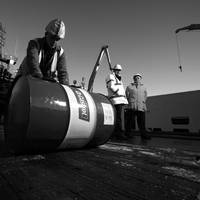EPA’s Vessel General Permit (VGP) & You
Nothing stirs the maritime pot like new regulation, and coming soon to you (in less than a month) is the new iteration of the Vessel General Permit (VGP). The VGP applies to vessels operating in a capacity as a means of transportation, that have discharges incidental to their normal operations into waters subject to this permit, except recreational vessels. Unless otherwise excluded from coverage, the waters subject to this permit means “territorial seas” of the U.S. The Clean Water Act (CWA) does not require NPDES permits for vessels or other floating craft operating as a means of transportation beyond the territorial seas, such as in the contiguous zone or ocean. The Environmental Protection Agency (EPA) is issuing a replacement VGP permit under its authority from the CWA.
Castrol Secures Environmental Acceptance

Less than six months before the U.S. Vessel General Permit takes effect, Castrol Marine is working with owners to ensure they are truly compliant within definitions set out for ‘Environmentally Acceptable Lubricant’ in U.S. waters. From December 2013, new requirements come into effect covering the substances deemed acceptable for discharge by ships in US waters. Few operators, perhaps, will be fully aware of what the revised ‘Vessel General Permit’ (VGP) means when it identifies “Environmentally Acceptable Lubricants” (EAL).
Castrol Calls for Clarity on Polar Lubricants Usage
As Polar shipping movements increase, Castrol Marine suggests that greater attention should be paid to the environmental credentials of lubricants used on board in applications where there is a risk of leakages and discharges. Growing demand for effective shipping routes and cruises to previously inaccessible destinations has led vessels into increasingly sensitive marine areas. Exemplary is the increasing amount of seaborne traffic beginning to move along the Siberian coast. There are also hopes of opening up more of the North West Passage above Canada. The Northern Sea Route voyage is one-third of the distance of traditional routes through the Suez Canal, bringing with it lower fuel costs.
Castrol GreenField Takes Environmental Lead
Castrol Offshore said its GreenField lubricants is likely to remain the only products fully tested to environmentally-responsible standards set by Norwegian authorities through 2011. Changes to Norwegian Activities Regulations introduced on January 1st 2010 require discharged lubricants and chemicals, used in closed systems in amounts of more than 3000kg a year per facility, to be registered for use offshore. Applications including crane hydraulics, thrusters, drilling system hydraulics and mooring winch gears, require Harmonised Offshore Chemicals Notification Format (HOCNF) registered products. Castrol Offshore proactively registered its products before the January 1st 2010 deadline. NEMS database.
Castrol Offshore Environmentally Safer Greases
A new performance standard for critical offshore operations will help North Sea oil and gas drilling operators comply with new environmental requirements. Under rules set by the North-East Atlantic regulator, OSPAR, the range of the UK Offshore Chemical Notification scheme is being extended from 1st January 2009 to include all greases used to lubricate jack-up open gearing – that raise and lower the platforms from and into the sea. The consequence for North Sea oil and gas drilling operators is that the environmental impact of all greases used will have to be established prior to use. Lubricants containing hazardous components may be excluded from use and many components used in existing greases will attract attention from the authorities.





